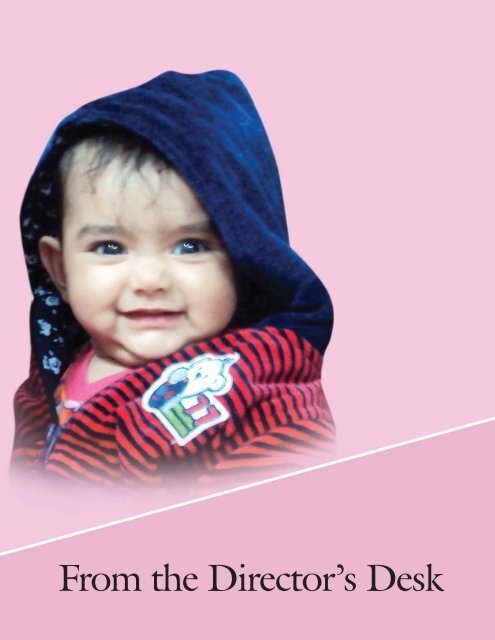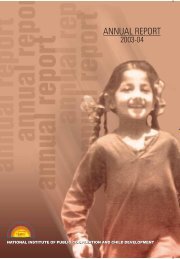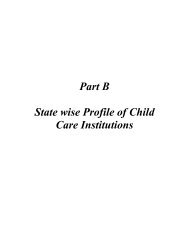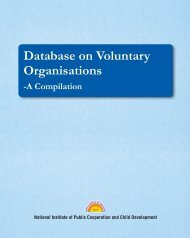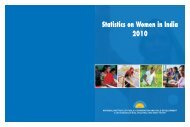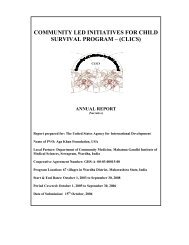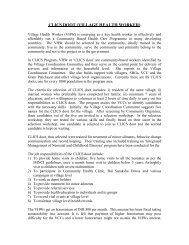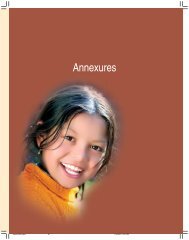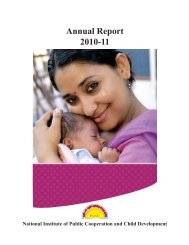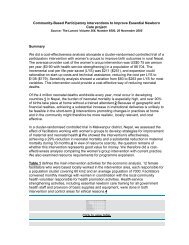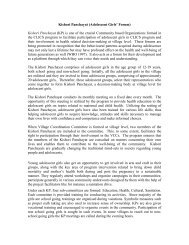From the Director's Desk - Nipccd
From the Director's Desk - Nipccd
From the Director's Desk - Nipccd
Create successful ePaper yourself
Turn your PDF publications into a flip-book with our unique Google optimized e-Paper software.
<strong>From</strong> <strong>the</strong> Director’s <strong>Desk</strong><br />
ANNUAL REPORT 2011-2012<br />
xi
<strong>From</strong> <strong>the</strong> Director’s <strong>Desk</strong><br />
It is my privilege & pleasure to<br />
present <strong>the</strong> Annual Report of National<br />
Institute of Public Cooperation and<br />
Child Development (NIPCCD) for<br />
<strong>the</strong> year 2011-12. Annual Report will<br />
serve as a mirror refl ecting <strong>the</strong> various<br />
achievements, aspirations and new<br />
initiatives of <strong>the</strong> Institute. Honest<br />
communication & practices that establish<br />
trust in <strong>the</strong> stakeholders have been <strong>the</strong><br />
hallmark of <strong>the</strong> Institute. The Annual<br />
Report of this year has a new look and it<br />
presents information in accordance with<br />
<strong>the</strong> promise we made last year to focus more clearly on <strong>the</strong> priority areas.<br />
National Institute of Public Cooperation and Child Development is an autonomous organisation under<br />
<strong>the</strong> aegis of <strong>the</strong> Ministry of Women and Child Development (MWCD), Government of India. Established<br />
in <strong>the</strong> year 1966 under <strong>the</strong> Society Registration Act, 1860 in New Delhi, <strong>the</strong> Institute has by now set up<br />
four Regional Centres at Guwahati (1978), Bengaluru (1980), Lucknow (1982) and Indore (2001) to<br />
cater to <strong>the</strong> region-specifi c requirements across <strong>the</strong> country. The Institute has been functioning as an apex<br />
institution for training of <strong>the</strong> Integrated Child Development Services (ICDS) functionaries since 1975.<br />
ICDS Scheme represents one of <strong>the</strong> world’s largest and most unique programmes for early childhood<br />
development. The Institute as a nodal resource agency has also been entrusted with <strong>the</strong> responsibility of<br />
training and capacity building of functionaries at <strong>the</strong> national and regional level, under <strong>the</strong> new Integrated<br />
Child Protection Scheme (ICPS).<br />
The Institute has two main constitutional bodies namely, <strong>the</strong> General Body and <strong>the</strong> Executive Council.<br />
While <strong>the</strong> General Body is responsible for formulating overall policies of <strong>the</strong> Institute, <strong>the</strong> Executive<br />
Council is responsible for management and administration of <strong>the</strong> Institute. Both <strong>the</strong>se bodies have<br />
representation of government and voluntary organisations. The Minister of State for Women and Child<br />
Development under whose administrative control <strong>the</strong> Institute is placed is <strong>the</strong> President of <strong>the</strong> General<br />
Body. The President of <strong>the</strong> General Body is also <strong>the</strong> Chairperson of <strong>the</strong> Executive Council.<br />
The objectives of <strong>the</strong> Institute are to: develop and promote voluntary action in social development;<br />
promote and develop relevant need-based programmes in pursuance of <strong>the</strong> National Policy for Children;<br />
evolve measures for coordination between governmental and voluntary action in social development;<br />
develop framework and perspective for organising children’s programmes through governmental and<br />
voluntary efforts; and establish liaison with international and regional agencies, research institutions,<br />
xiii<br />
ANNUAL REPORT 2011-2012
xiv<br />
universities and technical bodies engaged in activities similar to those of <strong>the</strong> Institute.<br />
The vision of <strong>the</strong> Institute is to be seen as an Institute of global repute in child rights, child protection<br />
and child development.<br />
New Initiatives<br />
In order to sustain and streng<strong>the</strong>n <strong>the</strong> Voluntary Organisations, <strong>the</strong> Institute besides o<strong>the</strong>r programmes<br />
organised two innovative programmes namely Training Programme on Capacity Building of<br />
Functionaries of VOs on Conceptualising and Execute a Project & Training Programme on<br />
Leadership and Sustainability of NGOs at Headquarters.<br />
A Sensitisation Programme for Nominated members of Executive Council and General Body of<br />
<strong>the</strong> Institute on Issues Related to Women and Children was organised by Headquarters at Regional<br />
Centre, Indore on 26 November, 2011. The main objectives of <strong>the</strong> programme were to: orient <strong>the</strong><br />
nominated members of <strong>the</strong> Executive Council and General Body of <strong>the</strong> Institute about NIPCCD, its<br />
genesis, vision, areas of concern, programme thrust areas and initiatives undertaken in <strong>the</strong> fi eld of women<br />
and child development; acquaint <strong>the</strong>m about policies and programmes for women and children initiated<br />
by MWCD, GOI; and make <strong>the</strong>m aware about issues relating to women and children. Eleven nominated<br />
members attended this training programme.<br />
In collaboration with Ministry of Women and Child Development, a Programme-Direct Communication<br />
with Adolescents (Seedha Samwad) on Rajiv Gandhi Scheme for Empowerment of Adolescent<br />
Girls (SABLA) was organised by <strong>the</strong> Institute on 11 May, 2011 at Rajiv Gandhi Stadium of ITI,<br />
Rae Bareli. The programme was presided by NAC Chairperson, Smt. Sonia Gandhi. A total number of<br />
15,000 adolescent girls’ and women attended <strong>the</strong> programme.<br />
A ‘Kishori Sammelan’ was organised by Ministry of Women and Child Development and NIPCCD on<br />
24 December, 2011 at Swarna Jayanti Park, Rohini, Delhi. The main objective of this Sammelan were<br />
to: make adolescent girls aware about Rajiv Gandhi Scheme for Empowerment of Adolescent- SABLA.<br />
The Sammelan was presided by Smt. Krishna Tirath, Hon’ble MOS I/c, Ministry of Women and Child<br />
Development, GOI. About 10,000 adolescents and women attended <strong>the</strong> Sammelan.<br />
Hon’ble MOS I/C (MWCD) and Chairperson, NIPCCD Smt. Krishna Tirath inaugurated <strong>the</strong><br />
Administrative Block Building of NIPCCD Regional Centre, Indore on 26 November, 2011. On<br />
this occasion she expressed her happiness and congratulated all <strong>the</strong> people of India especially western<br />
region of our country as this centre particularly caters to <strong>the</strong> need of this area. She stated, “I commend<br />
<strong>the</strong> Institute’s commitment to <strong>the</strong> remarkable pace which it has set for itself since its inception towards<br />
promoting voluntary action. Technical excellence and adherence to high ethical standards are essential<br />
conditions for growth and development of any profession. On this happy occasion it would be most<br />
appropriate for faculty and staff members of NIPCCD to reaffi rm <strong>the</strong>ir commitment to <strong>the</strong> cause of<br />
excellence, independence, ethical conduct and highest standards of professional integrity”.<br />
National Institute of Public Cooperation and Child Development
Ministry of Women and Child Development had organised Vatsalaya Mela from 15-19 November,<br />
2011 at Delhi Haat, New Delhi. A stall on Adolescent Guidance Service Centre (AGSC) was set up<br />
by <strong>the</strong> Institute wherein displays were designed for parents to understand <strong>the</strong> different requirements of<br />
adolescents and <strong>the</strong> services available for <strong>the</strong>m. The team of <strong>the</strong> AGSC was available onsite for all <strong>the</strong><br />
working hours to explain <strong>the</strong> working of <strong>the</strong> centre and also to respond to <strong>the</strong> queries of <strong>the</strong> parents.<br />
The prototype of life skills modules and o<strong>the</strong>r material on <strong>the</strong>mes such as stress, sex education, career<br />
choices etc. were displayed. The stall was visited by parents, teachers and many workers from Nongovernmental<br />
organisations and was appreciated by many. There were many requests for workshops for<br />
parents, career guidance workshops for adolescents on career guidance, training on life skills education<br />
and some specifi c queries related to adolescents with special needs. Wherever required, parents were<br />
referred to various centres including AGSC for counselling.<br />
NIPCCD team has been working hard with dedication to streng<strong>the</strong>ning its activities and focusing on its<br />
thrust areas. It is indeed a matter of great pleasure to inform you that in <strong>the</strong> year 2011–12, <strong>the</strong> Institute<br />
successfully organised a total of 314 training programmes which were attended by 10,717 participants.<br />
Out of it, 183 programmes were organised on issues relating to Women and Child Development including<br />
Child Protection and Juvenile Justice Act and 131 training programmes for functionaries of ICDS which<br />
were attended by 6,634 and 4,083 participants respectively. The Institute also completed 16 research<br />
studies/documentations during this year. Thus research and training activities go hand in hand with<br />
Institute’s pursuit of academic excellence.<br />
The seventh batch of Advanced Diploma in Child Guidance and Counselling commenced in August<br />
2011 in affi liation with Guru Gobind Singh Indraprastha University, New Delhi with a vision to<br />
bridge <strong>the</strong> gap of trained professionals for undertaking guidance and counselling interventions with<br />
children and <strong>the</strong>ir families in different settings. The course has been designed to enable <strong>the</strong> learner to<br />
assess and plan preventive, promotive and <strong>the</strong>rapeutic need-based and milieu-specifi c mental health<br />
programmes in schools and communities with children and adolescents. Twenty post graduate students<br />
from <strong>the</strong> disciplines of psychology, social work, and child development were enrolled during this year.<br />
Thus NIPCCD is proud to be able to guide <strong>the</strong>se students and transform <strong>the</strong>m into true professionals<br />
with <strong>the</strong> potential <strong>the</strong>y have.<br />
Early Childhood Care & Development (ECCD) plays an important role in <strong>the</strong> child’s life. Signifi cant<br />
changes occur in <strong>the</strong> child’s behaviour, thought processes, emotions & attitudes during this period.<br />
Towards understanding <strong>the</strong> importance of ECCD and enhancing <strong>the</strong> capabilities of functionaries<br />
implementing various programmes of child development in <strong>the</strong> voluntary sector, <strong>the</strong> Institute organised<br />
four Orientation Training Programmes on Early Childhood Care and Development (ECCD) for<br />
Voluntary Organisations and two Orientation Programme on Effective Management of ECCE<br />
for Senior Personnel of Social Organisations.<br />
Micronutrients such as vitamins and minerals are nutrients required in small quantities. These are<br />
xv<br />
ANNUAL REPORT 2011-2012
xvi<br />
responsible for vital functions of <strong>the</strong> human body. Malnutrition and micronutrient defi ciencies are a matter<br />
of serious concerns in our country. In order to combat iron, iodine and vitamin A defi ciency disorders,<br />
<strong>the</strong> Government of India initiated several intervention programmes in <strong>the</strong> last three-four decades. With<br />
<strong>the</strong> view to educate <strong>the</strong> communities about <strong>the</strong> dietary approaches, as also to orient <strong>the</strong>m to o<strong>the</strong>r foodbased<br />
strategies including food fortifi cation and home gardening to prevent micronutrient disorders, <strong>the</strong><br />
Institute organised two Orientation Courses on Prevention of Micronutrient Malnutrition and three<br />
Regional Consultations on Enhancing <strong>the</strong> Rates of Optimal IYCF in collaboration with BPNI, India<br />
during <strong>the</strong> year under report. In addition to this, two Orientation Trainings on Promotion of Infant<br />
and Young Child Feeding and Counselling for VOs were also organised.<br />
During this year, <strong>the</strong> Institute put emphasis on adolescent girls and issues related to <strong>the</strong>m. Two Orientation<br />
Courses on Adolescent Health and HIV/AIDS were organised by <strong>the</strong> Institute. Ano<strong>the</strong>r Training<br />
on Trainers on Life Skills Education (LSE) of Tribal Adolescent Girls was organised by Indore<br />
Regional Centre of <strong>the</strong> Institute. Besides <strong>the</strong>se programmes, a Sensitisation Programme for Promoting<br />
Reproductive Rights of Women and Adolescents for Agencies Working on Women Health Issues<br />
was also organised by Headquarters.<br />
Gender Budgeting is not an accounting exercise, it encompasses a gender perspective and sensitivity at<br />
all levels and stages of developmental planning, processes and implementation. Since <strong>the</strong> Government<br />
departments are expected to undertake gender budgeting exercise for various programmes and schemes<br />
by allocating resources meant for <strong>the</strong> benefi t of women it was necessary to orient <strong>the</strong>m to <strong>the</strong> concept<br />
and tools of gender budgeting. Therefore, <strong>the</strong> Institute organised one State Regional Workshop on<br />
Gender Budgeting for offi cials of Government Tamil Nadu.<br />
Domestic violence has been recognised as a serious offence in recent years, leading to enacting of<br />
“Protection of Women from Domestic Violence Act (PWDVA) 2005” and Notifi cation of Rules in 2006<br />
under <strong>the</strong> act, but <strong>the</strong> legislation itself cannot be a substitute for giving relief to victims of domestic<br />
violence. There is a need to equip <strong>the</strong> NGOs working against domestic violence, as well as <strong>the</strong> service<br />
providers and <strong>the</strong> Protection Offi cers notifi ed under <strong>the</strong> Act with <strong>the</strong> knowledge of <strong>the</strong> provisions of<br />
enforcement for effective implementation of <strong>the</strong> legislation and reduce incidents of domestic violence<br />
in <strong>the</strong> society. With this view, <strong>the</strong> Institute organised fi ve Sensitisation/Orientation Programmes on<br />
Effective Implementation of Protection of Women from Domestic Violence Act (PWDVA), 2005 for<br />
VOs/Law Enforcement Agencies/Protection Offi cers and Service Providers. Again a Sensitisation<br />
Training on Protection of Women from Domestic Violence Act for College/University Teachers was<br />
organised by Regional Centre, Guwahati. Besides, above programmes three Awareness Generation<br />
Camps for Volunteers of NGOs/PRI Members on Protection of Women from Domestic Violence<br />
Act (PWDVA) 2005 were also organised by <strong>the</strong> Institute’s Regional Centre, Indore.<br />
A safe city is one that promotes <strong>the</strong> elimination of gender-based violence, while at <strong>the</strong> same time affords<br />
equal opportunities for men and women in all <strong>the</strong> spheres of social, economic, cultural and political<br />
National Institute of Public Cooperation and Child Development
life. Making cities and communities safe for women and girls can expand <strong>the</strong>ir full social, economic,<br />
cultural and political participation as equal citizens. When <strong>the</strong>y are safe and comfortable, public spaces<br />
in cities and communities offer countless possibilities for <strong>the</strong> participation of women and girls in <strong>the</strong><br />
areas of work, education, politics, and recreation. The creation of safe cities and communities for women<br />
and girls depends on <strong>the</strong> elimination of <strong>the</strong> violence and insecurity that prevent women and girls from<br />
using public spaces freely as citizens with human rights to opportunity and safety. Police is excellent<br />
potential partners since <strong>the</strong>ir everyday work gives <strong>the</strong>m a good perspective on <strong>the</strong> violence women often<br />
experience in <strong>the</strong> city. They also have a critical role to play by offering protection and support services,<br />
and by developing violence prevention initiatives. Police is key factor in creating safe cities for women<br />
and girls due to <strong>the</strong>ir responsibility to work to prevent and respond to violence in public spaces. In order<br />
to remove <strong>the</strong> prejudices and biases of police offi cers towards women and to develop in <strong>the</strong>m <strong>the</strong> required<br />
professionalism (in terms of knowledge, skills and attitudes) for dealing with cases of violence against<br />
women more effectively, it is imperative that police should be suitably trained at all levels. In order to<br />
make police offi cers behave and act in a gender-sensitive manner in cases of violence against women<br />
and in <strong>the</strong> discharge of <strong>the</strong>ir duties in general, <strong>the</strong>re is a need to conduct gender sensitisation training<br />
courses for police. Keeping <strong>the</strong> above in view <strong>the</strong> Institute organised an Orientation Training for Law<br />
Enforcement Agencies on Safety and Security of Working Women and School/College going Girls<br />
in Delhi for Middle Level Police Offi cials (Inspectors and Sub Inspectors) of Delhi police.<br />
Social and Behaviour Change Communication (SBCC) is one of <strong>the</strong> names used to defi ne <strong>the</strong> interdisciplinary<br />
areas of work also known as Communication for Development, Development Communication,<br />
Behaviour Change Communication, Communication for Social Change etc. That communication<br />
perspective is rooted in <strong>the</strong> basic Sender-Message-Channel-Receiver (SMCR) model, which has been<br />
shown to be useful in disseminating information ra<strong>the</strong>r than promoting behaviour changes. In order to<br />
acquaint and train <strong>the</strong> NIPCCD trainers to <strong>the</strong> paradigm shift in <strong>the</strong> fi eld of communication, two Training<br />
Programmes on Strategic Applications of Social and Behaviour Change Communication (SBCC)<br />
were organised by Headquarters and Regional Centre, Indore during <strong>the</strong> year 2011-12.<br />
NIPCCD continued to discharge its responsibility as a Nodal Resource Institution in capacity building<br />
of all functionaries and o<strong>the</strong>r stakeholders dealing with <strong>the</strong> subject of child protection and juvenile<br />
justice. Child protection refers to protection from violence, exploitation, abuse and neglect – all <strong>the</strong>se<br />
are sheer violation of child rights in humanistic context. This year, <strong>the</strong> Institute organised a month-long<br />
Certifi cate Course on Child Rights and Protection. Again a Orientation Training on Child Rights<br />
and Child Protection for Superintendents /Probation Offi cers/ for Homes. The Institute also organised<br />
two Orientation/Sensitisation Programmes on Child Rights and Protection for School Principals/<br />
Teachers of Home Science Colleges/Department of Social Work.<br />
During <strong>the</strong> year under report <strong>the</strong> Institute organised eight Orientation/ Sensitisation Training on<br />
Juvenile Justice Act and Integrated Child Protection Scheme (ICPS) for JJBs, CWCs, SPSU, SCPS,<br />
xvii<br />
ANNUAL REPORT 2011-2012
xviii<br />
DCPS personnel, and o<strong>the</strong>r functionaries. Besides that, three Consultations on Juvenile Justice (Care<br />
and Protection of Children) Act, 2000 and its Amendment Act, 2006 were also organised with <strong>the</strong><br />
help of Ministry of Women and Child Development, Government of India. A Sensitisation Programme<br />
for Members of SJPUs & Probation Offi cers on JJ System and ICPS was organised by Regional<br />
Centre, Guwahati. Headquarters of <strong>the</strong> Institute organised a Sensitisation of Police Offi cials on Juvenile<br />
Justice (Care & Protection of Children) Act, 2000 and Amendment Act, 2006 (in collaboration<br />
with Haryana Police Academy). Apart from that two Regional Consultations for Members of Child<br />
Welfare Committees (CWCs) and Members of Juvenile Justice Boards (JJBs) were also convened<br />
at by Regional Centre, Guwahati.<br />
The Institute’s Headquarters and its Regional Centres located at Bengaluru, Guwahati, Indore and<br />
Lucknow organised twelve Vertical Training Programme of Block Level ICDS Functionaries for<br />
Quality Improvement in ICDS Programme in order to enhance <strong>the</strong> skills of CDPOs and Supervisors to<br />
enable <strong>the</strong>m act as master trainer for providing continuing education to AWWs at project level; provide<br />
inputs to improve knowledge and skills of all ICDS functionaries at project level for quality improvement<br />
in ICDS services; work jointly and formulate joint action plan at project level for quality improvement<br />
of delivery of ICDS services. In all, 493 ICDS functionaries received training.<br />
The Institute also organised four Training of Instructors of AWTCs/MLTCs on New WHO Child<br />
Growth Standards in ICDS and Use of MCP Card with <strong>the</strong> objectives to orient <strong>the</strong> Instructors of<br />
MLTCs and AWTCs to new WHO Child Growth Standards in ICDS and use of MCP Card. In all, 73<br />
Instructors received training in <strong>the</strong>se programmes.<br />
Apart from this twenty-one Training of Traininers on Rajiv Gandhi Scheme for Empowerment of<br />
Adolescent Girls (RGSEAG) - SABLA, Indira Gandhi Matritava Sahyog Yojana (IGMSY) Schemes<br />
and Use of MCP Care were organised with <strong>the</strong> objectives to orient <strong>the</strong> trainers and o<strong>the</strong>r concerned<br />
functionaries about <strong>the</strong> SABLA and IGMSY Schemes of MWCD, GOI and use of Mo<strong>the</strong>r and Child<br />
Protection Care. In all 670 participants attended <strong>the</strong>se trainings. Besides that a Vertical Training of<br />
ICDS Functionaries on PWDV Act, 2005, Female Foeticide, PNDT Act and Age at Marriage was<br />
organised by Headquarters.<br />
During <strong>the</strong> year 2011–12, <strong>the</strong> Institute completed following sixteen research/evaluation studies,<br />
compilations and o<strong>the</strong>r important projects.<br />
1. Study of Children’s Institutions in Assam<br />
2. Guidebook for Mo<strong>the</strong>r & Child Protection Card<br />
3. Status of Food Safety Measures in ICDS in Sou<strong>the</strong>rn Region<br />
4. A Quick Appraisal of ICDS Awareness in National Capital Region<br />
5. Module of Training of Trainers on SABLA: A Reference Document<br />
National Institute of Public Cooperation and Child Development
6. Gender Training Module for Capacity Building and Empowerment of Women<br />
7. Module on SABLA [Health, Nutrition, ARSH, Life Skill (Home Management)]<br />
8. Study on Monitoring Strategy of Preschool Education Component under ICDS<br />
9. Orientation Workshop for Members of Juvenile Justice Boards – Syllabi/Curriculum<br />
10. Database on Orphanages under Women and Children Institutions Licensing Act, 1956<br />
11. Designing Group Work intervention for Adolescents: A Training Strategy (PART A & B)<br />
12. Health and Nutritional Status of Women and Children of Pahari Korwa Tribe in Chhattisgarh<br />
13. Orientation Workshop for Chairpersons/Members of Child Welfare Committees – Syllabi/Curriculum<br />
14. Rehabilitation of Juveniles in Confl ict with Law and Children in Need of Care and Protection – A<br />
Study<br />
15. Scheme of Project Assist to Children Affected by Communal, Caste, Ethnic and Terrorist Violence/<br />
Riots – An Evaluation<br />
16. Data Base of Child Care Institutions Registered under Juvenile Justice (Care and Protection of<br />
Children) Act 2000 (as amended in 2006)<br />
In order to keep <strong>the</strong> faculty and staff updated on <strong>the</strong> latest knowledge in <strong>the</strong>ir fi eld of expertise, from<br />
time to time <strong>the</strong>y were deputed to various programmes/seminars/workshops conducted by reputed<br />
professional institutions in India and abroad. To mention a few, during <strong>the</strong> year 2011-12 Dr. Dinesh<br />
Paul, Director was deputed to attend programme entitled Regional Programme Managers on Scaling<br />
up on Adolescent Health Programme at Bangkok, Thailand from 11-14 October, 2011 organised by<br />
WHO Regional Offi ce for South-East Asia, New Delhi. Dr. Tejinder Kaur, Assistant Director was deputed<br />
to attend a training programme entitled Inferior Health Status of Girls and Gender Issues and Girl<br />
Child, Malnutrition and ICDS Scheme organised by Haryana Institute of Public Administration at<br />
Gurgaon on 23 June, 2011. Shri M. Bharat Kumar, Deputy Director was deputed to attend a training<br />
programme on Combating Child Traffi cking: Unravelling <strong>the</strong> Push and Pull Factors in <strong>the</strong> SAARC<br />
Region in Islamabad at Pakistan from 18-23 July, 2011. Dr. (Smt.) Neelam Bhatia, Joint Director, Dr. Rita<br />
Patnaik, Deputy Director, Dr. Om Raj Singh, Assistant Director, Smt. Shanta Gopalakrishnan, Assistant<br />
Director, Dr. Tejinder Kaur, Assistant Director, Dr. S.C. Joshi, Assistant Director, Shri H.P. Joshi, Research<br />
Assistant, Smt. Poonam Sharma, Research Assistant, Smt. Sunita Mathur, Assistant Director and Smt.<br />
Pranami Khaund Tamuly, Research Assistant were deputed to attend programme entitled Millennium<br />
Development Goals 4 and 5: Concerns, Constraints and Interventions at New Delhi on 29 August,<br />
2011. Smt. Shanta Gopalakrishnan, Assistant Director and Smt. D.R. Vijayalakshmi, Research Assistant<br />
were deputed to attend Training on Demonstration of Health Child Package at MGIMS Sewagram,<br />
xix<br />
ANNUAL REPORT 2011-2012
xx<br />
Maharashtra from 9-13 September, 2011. Shri K.C. George, Assistant Director was deputed to attend<br />
Consultation Meet with <strong>the</strong> Support and Assistance of MPTAST at Bhopal on 28 September, 2011.<br />
Shri B. Sahu, Assistant Director was deputed to attend seminar on National Seminar on Quality<br />
Dimensions of Early Childhood Care and Education at Bhubaneshwar from 24-25 November, 2011.<br />
Dr. Rita Patnaik, Deputy Director and Ms. Meenu Kapur, Research Assistant were deputed to attend<br />
programme on Promoting Adolescent Health & Prevention of HIV in Young People in collaboration<br />
with <strong>the</strong> World Health Organisation (WHO) and London School of Hygiene and Tropical Medicine<br />
(LSHTM) at New Delhi from 5-16 December, 2011. Shri Rajinder Singh, Assistant attended a training<br />
programme, Establishment Rules (ER) at ISTM, New Delhi from 2-6 January, 2012. Shri Gopal Dutt,<br />
Assistant was deputed to attend training programme on Reservation in Services for Scheduled Castes,<br />
Scheduled Tribes and OBCs (RIS), ISTM at New Delhi from 20-23 February, 2012.<br />
Shri M. Bharat Kumar, Deputy Director was awarded Ph. D on <strong>the</strong> topic Profi le and Job Satisfaction of<br />
Childline Project Personnel by Department of Studies in Social Work, Karnatak University, Dharwad,<br />
Karnataka. Shri Krishna Chandra Choudhary, Research Assistant was also awarded Ph. D on <strong>the</strong> topic<br />
Impact of Mass Media on Sexual Behaviour Across Generation from Jamia Millia Islamia, New<br />
Delhi during <strong>the</strong> year under report.<br />
The year also witnessed several promotions; Dr. Dinesh Paul, was promoted to <strong>the</strong> post of Director (Adhoc);<br />
Dr. Ashok Kumar, was promoted to <strong>the</strong> post of Additional Director (Ad-hoc); Shri. S.C. Srivastava<br />
was promoted to <strong>the</strong> post of Joint Director (Ad-hoc); Shri. G.B. Srivastava was promoted to <strong>the</strong> post of<br />
Joint Director (CS); Shri. B.R. Siwal was promoted to <strong>the</strong> post of Joint Director; Dr. T. Dung Dung was<br />
promoted to <strong>the</strong> post of Deputy Director; Ms. Shashi Kala Bodra and Shri Anand Kumar were promoted<br />
to <strong>the</strong> post of Assistant Director. Fur<strong>the</strong>r, during <strong>the</strong> year several new appointees joined NIPCCD family:<br />
Dr. (Smt.) Rita Patnaik joined as Deputy Director whereas Ms. Ritu Geu Goswami joined as Assistant<br />
Director. Ms. Aliya Tayyaba, Smt. Pranami Khaund Tamuly, Ms. Smita Sinha, Smt. Abhilasha Mishra,<br />
Ms. Purnima Thakur, Ms. Meenu Kapur, Shri Nilesh Mansing Shinde joined as Research Assistant in<br />
<strong>the</strong> Institute. Shri Pankaj Kumar and Shri Tarun Kumar Rohella joined as Stenographer Grade-III.<br />
During this year, 42 staff members of Group A, B, C and D have also been given benefi t under <strong>the</strong><br />
Modifi ed Assured Career Progression Scheme.<br />
During <strong>the</strong> year 2011-12, several faculty and staff members after attaining <strong>the</strong> age of superannuation<br />
were relieved from <strong>the</strong> services of <strong>the</strong> Institute. These were Shri Chandra Mohan, Research Assistant;<br />
Smt. Gindora Devi, PCM; Shri P.K. Barua, Joint Director; Smt. Alekutty Johnson, LDC/Typist; and<br />
Shri Om Prakash, Daftary. Dr. Sulochana Vasudevan, Joint Director took voluntary retirement from <strong>the</strong><br />
services of <strong>the</strong> Institute.<br />
During <strong>the</strong> year under report a Brazilian Scholar, Prof. Leila Bijos, visited <strong>the</strong> Institute on 24<br />
January, 2012 and had an Interactive Meeting with Director and o<strong>the</strong>r senior faculty members about <strong>the</strong><br />
programmes and activities of <strong>the</strong> Institute.<br />
National Institute of Public Cooperation and Child Development
<strong>From</strong> <strong>the</strong> year 2011-12, <strong>the</strong> Institute started acknowledging <strong>the</strong> contribution of offi cials of <strong>the</strong> Institute<br />
for <strong>the</strong>ir outstanding efforts. This year <strong>the</strong> commendation went to Dr. P. Krishnamoorthy, Regional<br />
Director at Indore Centre of <strong>the</strong> Institute.<br />
On behalf of NIPCCD and on my personal behalf I would like to express my full hearted thanks and<br />
gratitude to President, Smt. Krishna Tirath, Hon’ble Minister of State with Independent Charge, Ministry<br />
of Women and Child Development; Vice President, Shri D.K. Sikri & Smt. Neela Gangadharan, Vice<br />
Chairperson, Smt. Kamalakshi Sarma; and Dr. Shreeranjan, Joint Secretary for <strong>the</strong>ir valuable guidance<br />
and support to us from time to time. I take this opportunity to welcome members of <strong>the</strong> General Body<br />
of <strong>the</strong> Institute. I convey my sincere thanks and gratitude to <strong>the</strong> distinguished members of <strong>the</strong> General<br />
Body and Executive Council, who devoted <strong>the</strong>ir precious time in deliberations over various important<br />
issues of <strong>the</strong> Institute from time to time. A special word of thanks is due to Ministry of Women and Child<br />
Development, Government of India, State Governments, UNICEF, CARE, World Bank, BPNI,WHO,<br />
WFP for <strong>the</strong>ir continued support to <strong>the</strong> Institute.<br />
I must compliment <strong>the</strong> Senior Offi cers/ faculty members and all staff for carrying fur<strong>the</strong>r <strong>the</strong> dreams and<br />
aspiration of <strong>the</strong> founding fa<strong>the</strong>rs of <strong>the</strong> Institute by involving <strong>the</strong>mselves with devotion in <strong>the</strong> various<br />
activities of NIPCCD. I once again thank all and assure you of a challenging and vibrant environment<br />
an <strong>the</strong> institute where, toge<strong>the</strong>r, many benchmarks are set to be made and many heights set to be scaled.<br />
We invite you to visit our website www.nipccd.nic.in for more information.<br />
With warm regards,<br />
(Dinesh Paul)<br />
Director<br />
xxi<br />
ANNUAL REPORT 2011-2012
xxii<br />
National Institute of Public Cooperation and Child Development


